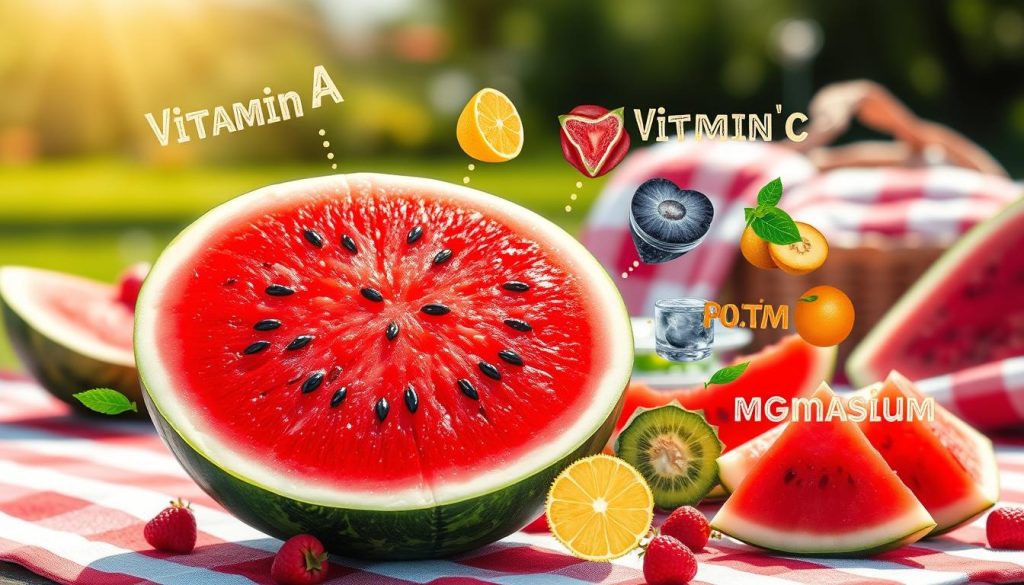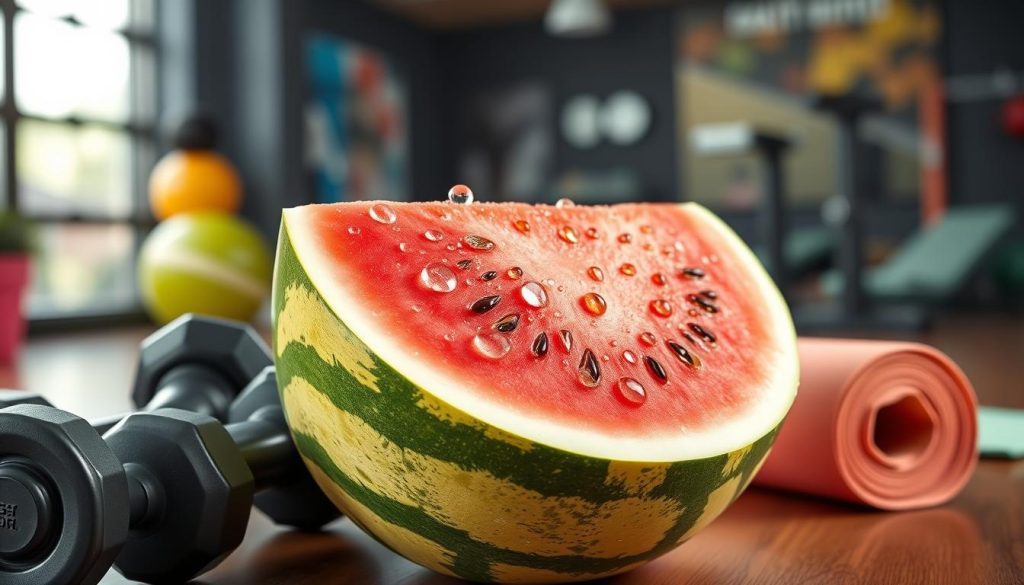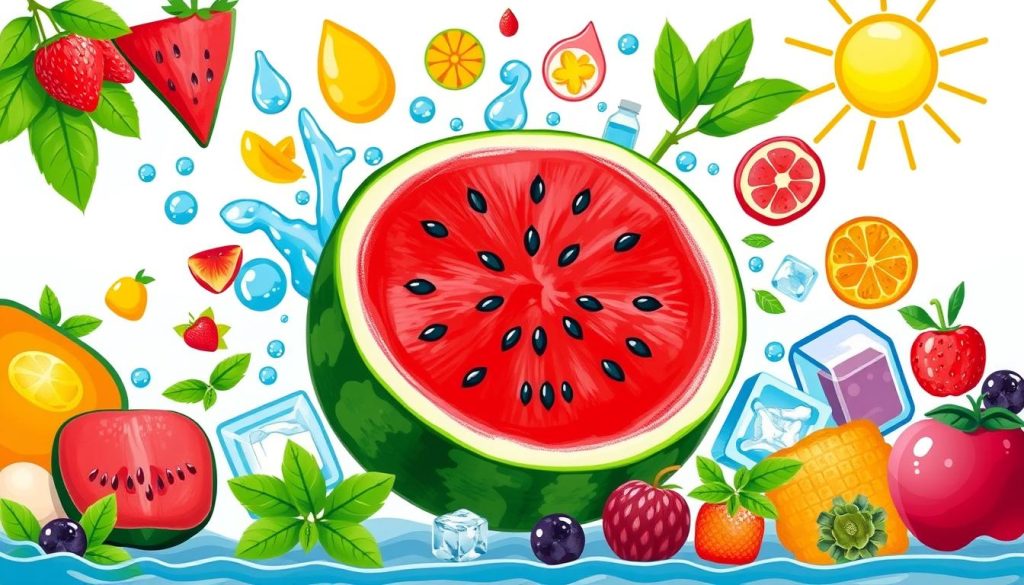Watermelon has been around for centuries, known for its juicy sweetness and bright red color. It’s more than a tasty summer treat; it’s a superfood full of vitamins, minerals, and antioxidants. In this guide, we’ll look at the top 20 health benefits of watermelon. We’ll cover its nutritional value, how it helps with hydration, and its effects on wellbeing.
Watermelon is packed with nutrients and is low in calories. It’s good for your heart, brain, skin, and helps with recovery after working out. You can eat it raw, grill it, or blend it into juice or smoothies. Watermelon is a treasure trove of health benefits.
Key Takeaways
- Watermelon is a hydrating fruit composed of 92% water, making it a great way to stay hydrated.
- It’s a rich source of vitamins A, C, and potassium, as well as the antioxidant lycopene.
- Watermelon may help lower blood pressure, reduce muscle soreness, and even fight certain types of cancer.
- The fruit’s low-calorie content and fiber make it a excellent choice for weight management and digestive health.
- Watermelon provides a variety of essential nutrients that support overall wellness, from skin health to brain function.
Understanding Watermelon: Nature’s Refreshing Superfood
Watermelon is a juicy fruit loved for its refreshing taste. It’s more than just a cool treat; it’s packed with nutrients. Let’s explore its origins, varieties, and what makes it so good for you.
Origins and Varieties of Watermelon
Watermelon comes from the Kalahari Desert in Africa. It’s been grown for thousands of years. Today, it’s enjoyed worldwide, with over 50 types available. You can find everything from classic seeded to unique yellow or orange varieties.
Basic Nutritional Profile
A single cup of raw, diced watermelon is a nutritional powerhouse. It contains:
- 46 calories
- 11.5 grams of carbohydrates
- 0.6 grams of fiber
- 9.4 grams of sugar
- 0.9 grams of protein
- 0.2 grams of fat
- 5% of the Daily Value (DV) for Vitamin A
- 14% of the DV for Vitamin C
- 4% of the DV for Potassium
- 4% of the DV for Magnesium
Selecting and Storing the Perfect Watermelon
Choose a watermelon that’s firm and heavy. Look for a yellow spot on the underside. This means it ripened fully. Store it in the fridge for up to 10 days. It’s perfect for hot summer days.
20 Health Benefits of Watermelon
Watermelon is a refreshing fruit packed with nutrients. It’s full of water, vitamins, minerals, and antioxidants. It also has unique compounds like citrulline and lycopene. These make watermelon a superfood that’s great for your health. Let’s look at 20 ways watermelon can improve your well-being.
- Hydration and Electrolyte Balance: Watermelon is mostly water, making it perfect for staying hydrated. One cup gives you about five ounces of water. It helps keep your body’s fluids balanced.
- Antioxidant Protection: Watermelon is full of lycopene, an antioxidant. It can lower the risk of diseases like cancer and heart disease. It protects cells and reduces inflammation.
- Improved Artery Function: Watermelon has l-citrulline, which may improve artery function. This can lower blood pressure and boost heart health.
- Weight Management: Watermelon is low in calories and high in fiber. It’s good for weight control. Studies show it can help you lose weight and improve blood pressure and cholesterol.
- Muscle Recovery: L-citrulline in watermelon can reduce muscle soreness. It helps athletes recover faster after exercise.
- Gut Health: Watermelon has prebiotics that support a healthy gut. They help grow good bacteria, improving digestion.
- Vitamin and Mineral Richness: Watermelon is rich in vitamins A and C, potassium, magnesium, and B vitamins. These are key for good health.
- Eye Health: Watermelon’s vitamins and antioxidants, like vitamin A and lycopene, protect the eyes. They help prevent age-related vision problems.
- Skin Health: Watermelon’s vitamins A and C improve skin elasticity and blood flow. They help repair skin cells, keeping your skin looking young.
- Immune System Support: Watermelon’s vitamin C, vitamin A, and antioxidants boost the immune system. They help protect against illness and infection.
Watermelon offers many health benefits. Adding it to your diet is a tasty way to support your health. It’s packed with nutrients that are good for you.
| Nutrient | Amount per Cup (152g) |
|---|---|
| Calories | 45.6 |
| Fat | 0.2g |
| Cholesterol | 0mg |
| Sodium | 1.52mg |
| Carbohydrate | 11.5g |
| Fiber | 0.6g |
| Vitamin C | 12.3mg |
| Potassium | 170mg |
| Calcium | 10mg |
| Vitamin A | 865 IU |
| Lycopene | 6,890 micrograms |
Watermelon is a versatile and nutritious fruit. It’s great for staying hydrated, supporting heart health, and boosting the immune system. It’s a fantastic addition to a healthy diet.
Hydration and Water Content Benefits
Watermelon is a top choice for staying hydrated. It has 92% water, making it a refreshing way to drink more water. Each slice helps you meet your daily water goals, perfect for those who find it hard to drink enough.
Role in Daily Water Intake
Drinking enough water is key for good health. Watermelon is a tasty way to get the hydration you need. A single cup of watermelon has 45.6 calories and 11.5g of carbs, making it a healthy choice for boosting water intake.
Electrolyte Balance
Watermelon is not just full of water; it’s also packed with electrolytes like potassium and magnesium. These minerals are important for muscle and nerve health. Eating watermelon helps replace lost electrolytes, especially when you sweat a lot or exercise.
Post-Exercise Recovery
Watermelon is great for athletes looking to recover after exercise. Drinking watermelon juice can lessen muscle soreness and speed up recovery. Its water, electrolytes, and antioxidants make it a natural choice for refueling after a workout.
“Watermelon is 92% water, making it an ideal hydrating fruit, with each slice contributing to hydration needs.”
Essential Vitamins and Minerals in Watermelon
Watermelon is a nutritional powerhouse, packed with essential vitamins and minerals. It’s not just a refreshing summer fruit. It’s a treasure trove of vital nutrients.
One cup of diced watermelon has 12 mg of vitamin C, which is 14% of what we need daily. Vitamin C boosts our immune system and helps our skin and wounds heal. Watermelon also has vitamin A, with 5% of the daily value per cup, which is good for our eyes and skin.
Watermelon is rich in minerals like potassium and magnesium. Each provides 4% of what we need daily. Potassium helps keep our blood pressure and muscles healthy. Magnesium is key for energy, nerve function, and strong bones.
Watermelon also has lycopene, citrulline, and polyphenols. These are antioxidants and phytochemicals that fight inflammation and improve heart health. They may even help fight cancer.
Eating watermelon is a tasty way to boost your health. Enjoy it as a snack, in smoothies, or in salads. It’s full of nutrients that nourish your body and keep you healthy.
| Nutrient | Amount per Cup | % Daily Value |
|---|---|---|
| Vitamin C | 12 mg | 14% |
| Vitamin A | 5% | 5% |
| Potassium | 170 mg | 4% |
| Magnesium | 15 mg | 4% |
Knowing about the watermelon vitamins and minerals helps you make smart choices. Add watermelon to your diet for its health benefits. It’s a great part of a balanced diet.

Antioxidant Properties and Disease Prevention
Watermelon is a refreshing superfood packed with antioxidants. It’s a fruit that fights off health threats. At its core is lycopene, which gives it its bright red color. This antioxidant is key in fighting free radicals and reducing oxidative stress.
Lycopene Benefits
Lycopene in watermelon is linked to lower cancer risks, like prostate and colorectal cancer. It might also fight inflammation, helping with conditions driven by it.
Free Radical Protection
Watermelon is full of antioxidants like vitamin C and cucurbitacin E. These work together to fight off free radicals. Free radicals can harm cells and lead to diseases like heart disease and cancer. Eating watermelon boosts your body’s defense against these threats.
Anti-inflammatory Effects
Watermelon also has citrulline, an amino acid with anti-inflammatory effects. This is good for those with chronic inflammation. It can help reduce inflammation and ease symptoms.
Adding watermelon to your diet can unlock its antioxidant and anti-inflammatory powers. It helps your body fight diseases and stay healthy. Enjoy watermelon and boost your health naturally!
Heart Health and Blood Pressure Management
Watermelon is more than just a cool treat for summer. It’s packed with nutrients that help your heart stay healthy. Lycopene and citrulline in watermelon are key players in managing blood pressure and boosting heart health.
Lycopene, the red pigment in watermelon, is a strong antioxidant. It helps lower cholesterol and cuts down heart disease risk. A study in the National Cancer Institute showed lycopene can slow prostate cancer cell growth.
Citrulline, an amino acid in watermelon, is also good for your heart. Research in the American Journal of Hypertension found watermelon extracts lower blood pressure in obese adults. A study in Menopause showed watermelon extract can also lower blood pressure and improve blood vessel flexibility in postmenopausal women.
| Nutrient | Benefit |
|---|---|
| Lycopene | Lowers cholesterol, reduces risk of heart disease |
| Citrulline | Helps reduce hypertension and lower blood pressure |
Adding watermelon to your diet is a tasty way to support heart health and keep blood pressure in check. Enjoy it as a snack, blend it into smoothies, or use it in recipes. Watermelon’s benefits make it a great addition to your wellness plan.
Weight Management and Digestive Benefits
Watermelon is a juicy summer fruit that helps with weight management. It’s full of water and low in calories. A cup of diced watermelon has only 45 calories, making it great for those watching their weight.
Watermelon also offers digestive benefits. Its fiber content, though small, aids in better digestion and keeps you feeling full. Studies show eating watermelon can improve your diet quality and help you eat fewer calories, aiding in weight loss.
Fiber Content and Satiety
Watermelon’s fiber helps you feel full and supports digestion. The fiber slows down nutrient absorption, which helps blood sugar levels rise more slowly. This leads to longer-lasting feelings of fullness.
Low-Calorie Properties
Watermelon is very hydrating, with over 90% water. Its low calorie count makes it perfect for managing weight. Studies found eating watermelon can lower body weight, BMI, and waist-to-hip ratio. It also reduces oxidative stress and boosts antioxidants.
In a study, 33 overweight or obese people were given watermelon or low-fat cookies. The watermelon group felt fuller and had lower blood pressure. The cookie group saw higher blood pressure and body fat.
Adding watermelon to your diet can help you lose weight or stay healthy. It’s a tasty and nutritious way to support your weight management goals.
Muscle Recovery and Exercise Performance
Watermelon is more than just a refreshing fruit. It’s also great for muscle recovery and exercise performance. It contains citrulline, an amino acid that boosts athletic abilities and reduces muscle soreness after workouts.
Citrulline in watermelon helps improve aerobic performance. It increases nitric oxide production, which widens blood vessels and boosts blood flow. This supports oxygen delivery to muscles, enhancing endurance and exercise capacity.
Watermelon also helps reduce muscle soreness after intense workouts. It does this by lowering inflammation and oxidative stress in muscles. This makes it easier for athletes to recover quickly and perform better.
Watermelon is packed with nutrients like vitamin C, vitamin B6, and magnesium. These support muscle health and recovery. They help with immune function, energy metabolism, and muscle function, all key for top athletic performance.
Adding watermelon to your post-workout routine is a natural way to replenish fluids and nutrients. It’s great for athletes and anyone wanting to improve fitness. The watermelon exercise benefits and watermelon citrulline make it a valuable part of your diet.
| Nutrient | Amount per Serving (1 cup, diced) | Percentage of Daily Value |
|---|---|---|
| Vitamin C | 12.5 mg | 14% |
| Vitamin B6 | 0.1 mg | 5% |
| Magnesium | 15 mg | 4% |
| Potassium | 314 mg | 7% |
| Citrulline | Approximately 250 mg | N/A |
By using watermelon exercise benefits and watermelon citrulline, you can boost your athletic performance and muscle recovery. Plus, you get to enjoy the refreshing taste of this versatile fruit.

Skin and Eye Health Benefits
Watermelon is more than just a cool summer snack. It’s packed with nutrients that are good for our skin and eyes. The vitamins and antioxidants in watermelon help keep our skin looking healthy and our vision sharp.
Vitamin C in watermelon is key for our skin. It helps make collagen, which keeps our skin elastic and strong. Eating enough vitamin C can make our skin look smoother and help it heal faster.
Vitamin A in watermelon is great for our eyes. It helps prevent age-related vision loss. Plus, watermelon’s lycopene protects our skin from the sun’s harmful rays.
| Nutrient | Benefits |
|---|---|
| Vitamin C | Promotes collagen production, improves skin elasticity and strength |
| Vitamin A | Crucial for eye health, may help prevent age-related macular degeneration |
| Lycopene | Provides protective effects against UV radiation, shielding the skin |
Eating watermelon can help keep your skin and eyes healthy. So, when you enjoy a slice, you’re not just pleasing your taste buds. You’re also taking care of your body’s natural beauty.
Cancer-Fighting Properties and Research
Watermelon is not just a tasty fruit; it’s also packed with nutrients that fight cancer. It contains powerful antioxidants like lycopene and cucurbitacin E. These compounds show great promise in fighting cancer.
Latest Scientific Studies
Recent studies have uncovered how watermelon might prevent or treat some cancers. Lycopene, the fruit’s red pigment, may lower prostate cancer risk. A 2019 study also found watermelon helps with weight, blood pressure, and antioxidants. These are all key in preventing cancer.
Preventive Mechanisms
- Lycopene in watermelon may help lower the risk of certain cancers by reducing insulin-like growth factor levels, which can contribute to tumor growth.
- Cucurbitacin E, another compound found in watermelon, has shown the ability to inhibit tumor growth by promoting the removal of cancer cells.
- The combination of antioxidants, vitamins, and minerals in watermelon, such as vitamin C, carotenoids, and phytosterols, work together to combat free radicals and oxidative stress, which are known contributors to cancer development.
While these findings are promising, more research is needed. We need to understand how watermelon fights cancer better. Eating watermelon can be a tasty way to help prevent cancer.
| Watermelon Compound | Potential Cancer-Fighting Properties |
|---|---|
| Lycopene | May lower risk of prostate cancer by reducing insulin-like growth factor levels |
| Cucurbitacin E | Inhibits tumor growth by promoting cancer cell removal |
| Antioxidants (vitamin C, carotenoids, phytosterols) | Combat free radicals and oxidative stress, which contribute to cancer development |
Conclusion
Watermelon is a superfood packed with health benefits. It’s full of water and electrolytes, and it’s rich in nutrients and antioxidants. Adding watermelon to your diet can help you stay healthy in many ways.
It’s great for staying hydrated, supporting heart health, managing weight, and reducing disease risk. This fruit is a powerful ally for your well-being.
The “20 Health Benefits of Watermelon” guide shows how this fruit can improve your health. As a watermelon fan, try different ways to add it to your life. You’ll see the benefits of a healthier, more vibrant you.
To get the most from watermelon, eat it in moderation. It should be part of a balanced diet. Let its vitamins, minerals, and antioxidants help your health. Start your journey to a healthier life with watermelon.


